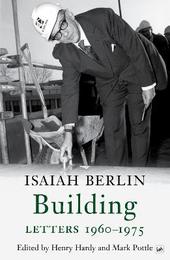
|
Building: Letters 1960-1975
Paperback / softback
Main Details
| Title |
Building: Letters 1960-1975
|
| Authors and Contributors |
By (author) Isaiah Berlin
|
|
Edited by Henry Hardy
|
|
Edited by Mark Pottle
|
| Physical Properties |
| Format:Paperback / softback | | Pages:704 | | Dimensions(mm): Height 234,Width 153 |
|
| Category/Genre | Western philosophy from c 1900 to now |
|---|
| ISBN/Barcode |
9781845952303
|
| Classifications | Dewey:192 |
|---|
| Audience | |
|---|
|
Publishing Details |
| Publisher |
Vintage Publishing
|
| Imprint |
Pimlico
|
| Publication Date |
7 April 2016 |
| Publication Country |
United Kingdom
|
Description
The third volume of Isaiah Berlin's remarkable letters takes us from 1960 to 1975 In the period covered here (1960-75) Isaiah Berlin creates Wolfson College, Oxford; John F. Kennedy becomes US President (and is assassinated); Berlin dines with JFK on the day he is told of the Soviet missile bases in Cuba; the Six-Day Arab-Israeli war of 1967 creates problems that are still with us today; Richard M. Nixon succeeds Johnson as US President and resigns over Watergate; and the long agony of the Vietnam War grinds on in the background. At the same time Berlin publishes some of his most important work, including Four Essays on Liberty - the key texts of his liberal pluralism - and the essays later included in Vico and Herder. He talks on the radio, appears on television and in documentary films and gives numerous lectures, especially his celebrated Mellon Lectures, later published as The Roots of Romanticism. Behind these public events is a constant stream of gossip and commentary, acerbic humour and warm personal feeling. Berlin writes about an enormous range of topics to a sometimes dazzling cast of correspondents. This new volume leaves no doubt that Berlin is one of the very best letter-writers of the twentieth century.
Author Biography
Isaiah Berlin was born in Riga, now capital of Latvia, in 1909. When he was six, his family moved to Russia, and in Petrograd in 1917 Berlin witnessed both Revolutions - Social Democratic and Bolshevik. In 1921 he and his parents emigrated to England, where he was educated at St Paul's School, London, and Corpus Christi College, Oxford. Apart from his war service in New York, Washington, Moscow and Leningrad, he remained at Oxford thereafter - as a Fellow of All Souls, then of New College, as Chichele Professor of Social and Political Theory, and as founding President of Wolfson College. He also held the Presidency of the British Academy. His published work includes Karl Marx, Russian Thinkers, Concepts and Categories, Against the Current, Personal Impressions, The Sense of Reality, The Proper Study of Mankind, The Roots of Romanticism, The Power of Ideas, Three Critics of the Enlightenment, Freedom and Its Betrayal, Liberty, The Soviet Mind and Political Ideas in the Romantic Age. As an exponent of the history of ideas he was awarded the Erasmus, Lippincott and Agnelli Prizes; he also received the Jerusalem Prize for his lifelong defence of civil liberties. He died in 1997.
ReviewsIB was one of the great affirmers of our time, a man to be admired not only for his intellectual achievements but for his loyalty, his humor, his modesty, his delight in the world and the people in it. Building is a wonderful edifice in his honor, meticulously, indeed lovingly, edited and annotated -- John Banville * New York Review of Books * Berlin was sui generis. There never was anyone like him before, and there probably will not be anyone like him again... He was, above all, a genuine -- as opposed to a stage -- liberal, who believed people were entitled to their beliefs and even to their prejudices, and both could be accommodated -- DJ Taylor * Independent on Sunday * Consistently interesting and at times strikingly unexpected, these letters show sides of Berlin that have not been seen before -- John Gray * Literary Review * Berlin's achievement was immense, in making ideas entertaining in a culture generally averse to them... One way to read [him] today is to relish the passionate man between the high-flown lines -- Lesley Chamberlain * Independent * There are many wonderful sketches. Of, for example, President Kennedy... or Roy Jenkins... and there are damning judgments of many great and good... Dip in and savour a lost world.... For reasons of technology (email and text) and also of intellectual culture the letters of today's Berlins... will simply not exist for future historians -- David Goodhart * Sunday Times (Culture) *
|